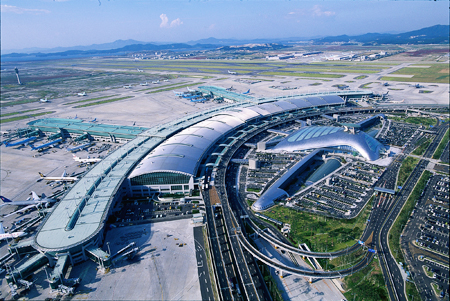Why is Incheon Airport up for sale?

The Lee Myung-bak administration and the government are facing a strong backlash in their attempts to sell Incheon International Airport and privatize one of the world’s most modern and profitable transport hubs.
Many people are scratching their heads as to why the government is stubbornly sticking with its immensely unpopular initiative of selling the airport. Rumors and speculation abounds but nothing has yet to fully explain the reason.
When asked about the government’s attempt, one executive of an asset-management firm involved in a number of public-private investment projects, only identified by his last name Kim, just lets out a sigh and laughed.
“So why is the government trying this hard to sell Incheon Airport? What’s the reasoning and what’s at stake?’’ asks Kim, stressing the “why.”
The Ministry of Strategy and Friday confirmed that it will move to revise related regulations to pave the way for the government to sell part of its stake in the airport. Finance Minister Bahk Jae-wan expressed confidence of getting the legal stuff done within the remaining nine months of the Lee administration. Korea’s next presidential polls will come in December and Lee is forbidden from seeking reelection.
“It will take more than one year to start its sales process after the new legal framework is established,’’ he told reporters in Seoul.
Bahk said the government is just trying to do what it can do and emphasized that the changes will not be pursued unilaterally, but through talks with lawmakers. He also said that the stake sale will improve the competitiveness of the airport by enhancing its operational efficiency.
However, talking about efficiency doesn’t come close to soothing the deafening voices of critics who raise concerns about the government selling off the country’s key assets to opportunistic financial investors, including foreign ones.
Lawmakers, even from the ruling Saenuri Party, are criticizing policymakers from pushing ahead with their plans to sell the government skate in the Incheon Airport, saying that the decision should be made by the new government that sets in February next year.
The airport being consistently rated as one of the world’s best in customer service, transportation and cargo-handling capability makes it further confounding why the government is so eager to sell its shares. This has led to suspicions of cronyism and all sorts of imaginary accusations.
Some pundits, like popular Internet podcaster Kim Eo-jun, wondered whether Macquarie, an Australian investment group, is somehow linked with the Incheon airport issue as President Lee’s nephew, Lee Ji-hyung, had once worked for the company’s Korean asset-management unit.
However, the allegations don’t seem to have legs as Macquarie Asset Management, a public firm, currently has no investment of any kind related to the airport and the younger Lee is no longer related with the company.
Others wonder whether the government needs the cash to make up for the decline in internal revenue after it took a series of steps in past years to cut taxes for high-income earners, who had been the staunchest supporters of Lee, who is now popular as gout.
Government officials balk at the idea, saying they are nowhere near pushing the panic button in managing the state coffer.
“We will pursue the project transparently in cooperation with the National Assembly. The rumor and suspicion will be gone if the sale process is sought by transparent measures such as open public sales,” said Park Chun-seop, a chief spokesman of the finance ministry.
Park said that the government wants to brace for reformation of the airport in advance as it needs to be revamped to sustain more demands in the future.
“The Incheon International Airport will need to be renovated as international flights are expected to increase in the future. We want to expand it in advance,” Park said.
He compared it to a construction of nuclear plants as the country should have built more nuclear plants to brace for increased electricity demands.
The spokesman, however, said that the government plans to hold more than half of the stake in the airport to keep its influence in it. He said that detailed decisions will be made in the next government, and the ministry will pay the way for the next administration.
However, critics still suspect that the government’s ultimate plan is to divest. Woo Seok-hun, an economist at Sungkonghoe University, who has opposed the plan, said that the finance ministry still seeks to sell the airport to foreign companies.
“What officials from the Ministry of Strategy and Finance aims on the Incheon International Airport is to attract at least one percent of capital from the U.S., and make them use the investor-state dispute,” said Woo at his twitter page last week.
One senior finance ministry official, who didn’t want to be named, admitted that unloading the government stake in Incheon Airport, may not be clear-cut as the best decision for the long-term future.
“Let’s say you have a very precious car, a limited-edition one that will retain its value over time. Selling it now of course will give you money to spend and find value elsewhere. But you can also decide to not sell it and leave it for your son, who might need it more than you do now sometime in the future. So yes, there are some points to debate philosophy wise,’’ he said.
Incheon International Airport was established in 1999 to cover more demands from domestic and overseas. It connects people from Korea and other Northeast Asian countries to all across the globe. <The Korea Times/Kim Jae-won>




